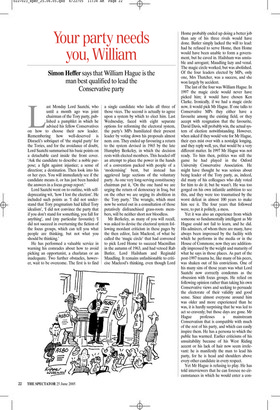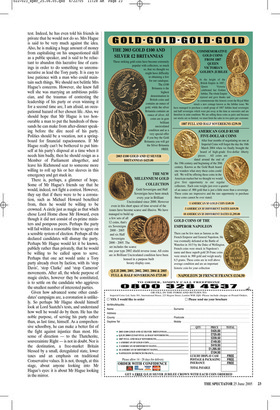Your party needs you, William
Simon Heffer says that William Hague is the man best qualified to lead the Conservative party Last Monday Lord Saatchi, who until a month ago was joint chairman of the Tory party, published a pamphlet in which he advised his fellow Conservatives on how to choose their new leader. Remembering how well-deserved is Disraeli’s sobriquet of ‘the stupid party’ for the Tories, and for the avoidance of doubt, Lord Saatchi summarised his basic points on a detachable card inside the front cover. ‘Ask the candidate to describe: a noble purpose; a fight against injustice; a sense of direction; a destination. Then look into his or her eyes. You will immediately see if the candidate means it, or has just been handed the answers in a focus group report.’ Lord Saatchi went on to outline, with selfdeprecating wit, ‘how I lost the election’. He included such points as ‘I did not understand that Tory pragmatism had killed Tory idealism’, ‘I did not convince the party that if you don’t stand for something, you fall for anything’, and (my particular favourite) ‘I did not succeed in overturning the fiction of the focus groups, which can tell you what people are thinking, but not what you should be thinking.’ He has performed a valuable service in warning his comrades about how to avoid picking an opportunist, a charlatan or an inadequate. Two further obstacles, however, wait to be overcome. The first is to find a single candidate who lacks all three of those vices. The second is actually to agree upon a system by which to elect him. Last Wednesday, faced with eight separate options for reforming the electoral system, the party’s MPs humiliated their present leader by voting down his proposals almost nem. con. They ended up favouring a return to the system devised in 1965 by the late Humphry Berkeley, in which the decision rests with elected members. This headed off an attempt to place the power in the hands of a convention packed with people of a ‘modernising’ bent, but instead has aggrieved large sections of the voluntary party. As one very long-serving constituency chairman put it, ‘On the one hand we are urging the return of democracy in Iraq, but on the other we are urging its abolition in the Tory party.’ The wrangle, which must now be sorted out in a consultation of those putatively disfranchised grass-roots members, will be neither short nor bloodless.
Mr Berkeley, as many of you will recall, was asked to devise the electoral system following mordant criticism in these pages by the then editor, Iain Macleod, of what he called the ‘magic circle’ that had convened to pick Lord Home to succeed Macmillan in the autumn of 1963, and had vetoed Rab Butler, Lord Hailsham and Reginald Maudling. It remains unfashionable to criticise Macleod’s thinking, even though Lord Home probably ended up doing a better job than any of his three rivals would have done. Butler simply lacked the will to lead: had he refused to serve Home, then Home would have been unable to form a government, but he caved in. Hailsham was unstable and arrogant; Maudling lazy and venal. The magic circle worked, but was abolished. Of the four leaders elected by MPs, only one, Mrs Thatcher, was a success, and she won largely by accident.
The last of the four was William Hague. In 1997 the magic circle would never have picked him; it would have chosen Ken Clarke. Ironically, if we had a magic circle now, it would pick Mr Hague. If one talks to Conservative MPs they either have a favourite among the existing field, or they accept with resignation that the favourite, David Davis, will probably win, the actual system of election notwithstanding. However, when asked if they would vote for Mr Hague, their eyes mist over with a nostalgic longing, and they reply well, yes, that would be a very different matter. In 1997 Mr Hague was not ready. To him then, politics was still the game he had played in the Oxford University Conservative Association. He might have thought he was serious about being leader of the Tory party, as, indeed, did many of his colleagues who duly voted for him to do it; but he wasn’t. He was too gorged on his own infantile ambition to see this, and they were too traumatised by the worst defeat in almost 100 years to make him see it. The four years that followed were, to put it politely, a mess.
Yet it was also an experience from which someone so fundamentally intelligent as Mr Hague could not fail to learn, and he did. His admirers, of whom there are many, have always been impressed by the facility with which he performs in the media or in the House of Commons; now they are additionally impressed by the weight and maturity of what he says in those places. As part of the post-1997 trauma he, like many of his peers, was shaken out of his convictions. One of his many sins of those years was what Lord Saatchi now correctly condemns as the obsession with focus groups. He relied on following opinion rather than taking his own Conservative views and seeking to persuade the electorate of their validity and good sense. Since almost everyone around him was older and more experienced than he was, it is hardly surprising that he was led to act so cravenly; but those days are gone. Mr Hague professes a mainstream Conservatism that is compatible with much of the rest of his party, and which can easily inspire them. He has a persona to which the public has warmed. Earlier criticisms of his unsuitability because of his West Riding accent or his lack of hair now seem irrelevant: he is manifestly the man to lead his party, for he is head and shoulders above every other candidate in every respect.
Yet Mr Hague is refusing to play. He has told interviewers that he can foresee no circumstances in which he would enter a con test. Indeed, he has even told his friends in private that he would not do so. Mrs Hague is said to be very much against the idea. Also, he is making a huge amount of money from capitalising on his unquestioned skill as a public speaker, and is said to be reluctant to abandon this lucrative line of earnings in order to do something so unremunerative as lead the Tory party. It is easy to lose patience with a man who could maintain such things. We should not belittle Mrs Hague’s concerns. However, she knew full well she was marrying an ambitious politician, and the traumas of contesting the leadership of his party or even winning it for a second time are, I am afraid, an occupational hazard of her chosen life. Also, we should hope that Mr Hague is too honourable a man to put the hundreds of thousands he can make from after-dinner speaking before the dire need of his party. Politics should be a vocation, not a springboard for financial rapaciousness. If Mr Hague really can’t be bothered to put himself at his party’s disposal at a time when it needs him badly, then he should resign as a Member of Parliament altogether, and leave his Richmond seat to someone more willing to roll up his or her sleeves in this emergency and get stuck in.
There is, perhaps, a glimmer of hope. Some of Mr Hague’s friends say that he would, indeed, not fight a contest. However, they say that if there were to be a coronation, such as Michael Howard benefited from, then he would be willing to be crowned. A circle just as magic as that which chose Lord Home chose Mr Howard, even though it did not consist of ex-prime ministers and pompous peers. Perhaps the party will fail within a reasonable time to agree on a sensible system of election. Perhaps all the declared candidates will dismay the party. Perhaps Mr Hague would let it be known, publicly rather than privately, that he would be willing to be called upon to serve. Perhaps that one act would unite a Tory party already riven by faction, with its ‘stop Davis’, ‘stop Clarke’ and ‘stop Cameron’ movements. After all, the whole purpose of magic circles, however they be constituted, is to settle on the candidate who aggrieves the smallest number of interested parties.
Given how advanced some other candidates’ campaigns are, a coronation is unlikely. So perhaps Mr Hague should himself look at Lord Saatchi’s tests, and understand how well he would do by them. He has the noble purpose, of serving his party rather than, as last time, himself. As a comprehensive schoolboy, he can make a better fist of the fight against injustice than most. His sense of direction — to the Thatcherite, souverainiste Right — is not in doubt. Nor is the destination, a free-market Britain blessed by a small, deregulated state, lower taxes and an emphasis on traditional Conservative values. It is not, though, at this stage, about anyone looking into Mr Hague’s eyes: it is about Mr Hague looking in the mirror.



































































 Previous page
Previous page